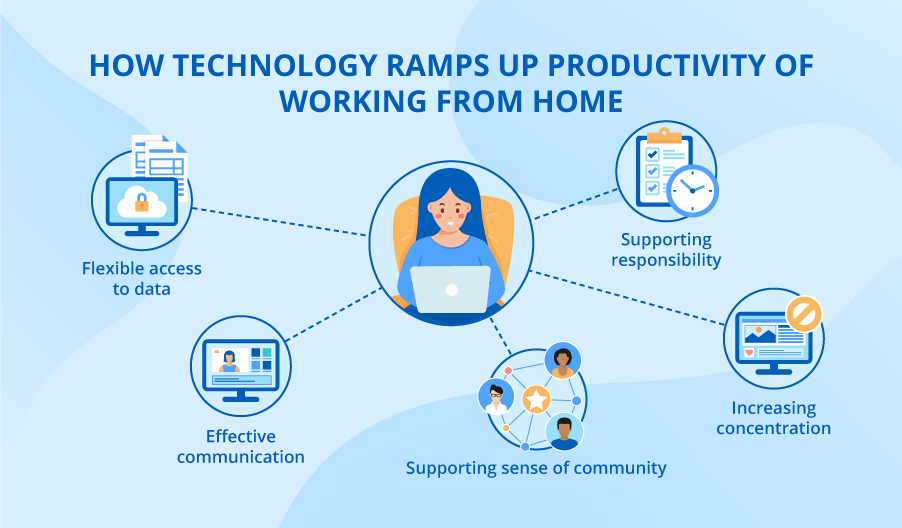Technology has revolutionized the way we work and live. It has impacted every aspect of our lives and has made our lives easier and more convenient. One of the areas where technology has had a significant impact is productivity. There are several productivity technology innovations that have been developed in recent years that have the potential to transform the way we work. In this article, we will discuss the top productivity technology innovations you need to know about.
1. Artificial Intelligence (AI)
Artificial intelligence is becoming increasingly popular in the workplace, and it has the potential to revolutionize the way we work. AI can automate repetitive tasks, analyze data, and provide insights that humans may not be able to identify. AI-powered tools can be used to improve productivity in several ways, such as automating administrative tasks, analyzing customer data to identify trends and patterns, and predicting equipment failures before they occur.
 Source: bing.com
Source: bing.com2. Cloud Computing
Cloud computing is another productivity technology innovation that has revolutionized the way we work. The cloud allows us to store and access data and applications over the internet, from anywhere in the world. This means we can work on the go, from any device, which can improve our productivity and efficiency. The cloud also allows us to collaborate with colleagues in real-time, which can improve communication and collaboration.
 Source: bing.com
Source: bing.com3. Virtual and Augmented Reality
Virtual and augmented reality are two productivity technology innovations that have the potential to transform the way we work. These technologies can be used to create immersive training experiences, enable remote collaboration, and improve the accuracy and efficiency of manufacturing processes. For example, a worker wearing an augmented reality headset could see step-by-step instructions overlaid on the machine they are working on, which could improve their productivity and reduce errors.
 Source: bing.com
Source: bing.com4. Internet of Things (IoT)
The Internet of Things (IoT) is a network of connected devices that can communicate with each other and with humans. This technology can be used to improve productivity in several ways, such as monitoring equipment to predict failures, tracking inventory in real-time, and automating routine tasks. IoT can also be used to improve workplace safety, by monitoring the environment for hazards and alerting workers to potential dangers.
 Source: bing.com
Source: bing.com5. Workflow Automation
Workflow automation is the use of technology to automate routine tasks, such as sending emails, creating documents, and scheduling appointments. This can free up time for more important tasks, such as strategic planning and decision-making. Workflow automation can also improve the accuracy and consistency of tasks, by reducing the risk of human error.
 Source: bing.com
Source: bing.com6. Collaboration Tools
Collaboration tools are software applications that enable teams to work together on projects, regardless of their location. These tools can include video conferencing, chat, and project management software. Collaboration tools can improve productivity by enabling teams to communicate in real-time, share information, and work together more efficiently.
 Source: bing.com
Source: bing.com7. Mobile Technology
Mobile technology has become an essential productivity tool for many workers. Smartphones and tablets can enable workers to work on the go, access important information, and communicate with colleagues and clients from anywhere in the world. Mobile technology can improve productivity by enabling workers to stay connected and work efficiently, regardless of their location.
 Source: bing.com
Source: bing.com8. Time-Tracking Software
Time-tracking software can help workers to manage their time more effectively, by enabling them to track the time they spend on tasks and projects. This can help workers to identify areas where they may be wasting time and improve their efficiency. Time-tracking software can also help managers to monitor the productivity of their team and identify areas for improvement.
 Source: bing.com
Source: bing.com9. Project Management Software
Project management software can help teams to plan, organize, and track their projects more efficiently. This software can enable teams to collaborate on projects, assign tasks, track progress, and communicate with team members. Project management software can improve productivity by enabling teams to work more efficiently, reducing the risk of missed deadlines and improving the quality of work.
 Source: bing.com
Source: bing.com10. Voice Recognition Software
Voice recognition software can be used to transcribe voice recordings into text, which can be useful for note-taking, dictation, and transcription. This technology can be used to improve productivity by enabling workers to take notes and record ideas without having to type them out. Voice recognition software can also be used to automate routine tasks, such as entering data into a database.
 Source: bing.com
Source: bing.com11. Email Management Tools
Email management tools can help workers to manage their email more efficiently, by enabling them to sort and prioritize emails, unsubscribe from unwanted emails, and automate routine tasks. This can help workers to reduce the time they spend on email and improve their productivity.
 Source: bing.com
Source: bing.com12. Digital Assistants
Digital assistants, such as Siri and Alexa, can be used to automate routine tasks, such as setting reminders, making phone calls, and sending text messages. These assistants can be accessed through smartphones, smart speakers, and other devices, and can help workers to save time and improve their productivity.
 Source: bing.com
Source: bing.com13. Cybersecurity Tools
Cybersecurity tools can help to protect data and systems from cyber attacks, which can improve productivity by reducing downtime and preventing data loss. These tools can include antivirus software, firewalls, and intrusion detection systems.
 Source: bing.com
Source: bing.com14. Online Learning Platforms
Online learning platforms, such as Coursera and Udemy, can be used to improve skills and knowledge, which can improve productivity and efficiency. These platforms offer courses on a wide range of topics, from leadership and management to software development and data analysis.
 Source: bing.com
Source: bing.com15. Social Media Management Tools
Social media management tools can help businesses to manage their social media presence more efficiently, by enabling them to schedule posts, track engagement, and analyze data. This can improve productivity by reducing the time businesses spend on social media and improving the effectiveness of their social media strategy.
 Source: bing.com
Source: bing.com16. Customer Relationship Management (CRM) Software
Customer Relationship Management (CRM) software can help businesses to manage their customer relationships more efficiently, by enabling them to track customer interactions, analyze customer data, and automate routine tasks. This can improve productivity by enabling businesses to provide better customer service and improve their sales and marketing efforts.
 Source: bing.com
Source: bing.com17. Online Payment Systems
Online payment systems, such as PayPal and Stripe, can be used to streamline the payment process, which can improve productivity and efficiency. These systems can enable businesses to accept payments online, automate invoicing, and track payments and expenses.
 Source: bing.com
Source: bing.com18. Electronic Signatures
Electronic signatures can be used to sign documents electronically, which can improve productivity by reducing the time and cost associated with printing, mailing, and signing paper documents. Electronic signatures are legally binding and can be used for a wide range of documents, such as contracts, agreements, and invoices.
 Source: bing.com
Source: bing.com19. Online Scheduling Tools
Online scheduling tools can help businesses to manage their appointments more efficiently, by enabling them to schedule appointments online, automate reminders, and track attendance. This can improve productivity by reducing the time businesses spend managing appointments and improving the accuracy of their scheduling.
 Source: bing.com
Source: bing.com20. Cloud Storage
Cloud storage can be used to store and access files and documents over the internet, from anywhere in the world. This can improve productivity by enabling workers to access important files and documents on the go, from any device. Cloud storage can also improve collaboration by enabling teams to share and collaborate on files in real-time.
 Source: bing.com
Source: bing.com21. Online Marketing Tools
Online marketing tools can help businesses to reach their target audience more effectively, by enabling them to create and manage online marketing campaigns, track engagement, and analyze data. This can improve productivity by reducing the time and cost associated with traditional marketing methods and improving the effectiveness of their marketing efforts.
 Source: bing.com
Source: bing.com22. Online Task Management Tools
Online task management tools can help businesses to manage their tasks more efficiently, by enabling them to assign tasks, track progress, and communicate with team members. This can improve productivity by reducing the time and effort associated with managing tasks and improving the accuracy of task management.
 Source: bing.com
Source: bing.com23. Digital Marketing Analytics
Digital marketing analytics can be used to analyze data from online marketing campaigns, which can help businesses to improve the effectiveness of their marketing efforts. These analytics can provide insights into customer behavior, campaign performance, and the effectiveness of different marketing channels.
 Source: bing.com
Source: bing.com24. Online HR Management Tools
Online HR management tools can help businesses to manage their human resources more efficiently, by enabling them to track employee data, manage benefits, and automate routine tasks. This can improve productivity by reducing the time and effort associated with managing HR tasks and improving the accuracy of HR management.
 Source: bing.com
Source: bing.com25. Online Accounting Tools
Online accounting tools can help businesses to manage their finances more efficiently, by enabling them to track income and expenses, manage invoices, and automate routine tasks. This can improve productivity by reducing the time and effort associated with managing finances and improving the accuracy of financial management.
 Source: bing.com
Source: bing.com26. Online Legal Services
Online legal services can help businesses to access legal advice and services more efficiently, by enabling them to find and hire lawyers online, access legal documents, and automate routine legal tasks. This can improve productivity by reducing the time and cost associated with traditional legal services and improving the accuracy of legal management.
 Source: bing.com
Source: bing.com27. Online Customer Service Tools
Online customer service tools can help businesses to manage their customer service more efficiently, by enabling them to provide support online, manage customer interactions, and automate routine tasks. This can improve productivity by reducing the time and effort associated with managing customer service and improving the quality of customer support.
 Source: bing.com
Source: bing.com28. Online Travel Management Tools
Online travel management tools can help businesses to manage their travel more efficiently, by enabling them to book travel online, track expenses, and automate routine tasks. This can improve productivity by reducing the time and effort associated with managing travel and improving the accuracy of travel management.
 Source: bing.com
Source: bing.com29. Online Inventory Management Tools
Online inventory management tools can help businesses to manage their inventory more efficiently, by enabling them to track inventory levels, manage orders, and automate routine tasks. This can improve productivity by reducing the time and effort associated with managing inventory and improving the accuracy of inventory management.
Related video of The Top Productivity Technology Innovations You Need to Know About
DAFTAR ISI
 Majalah Pulsa Kumpulan Berita dan Informasi Seputar Teknologi
Majalah Pulsa Kumpulan Berita dan Informasi Seputar Teknologi



